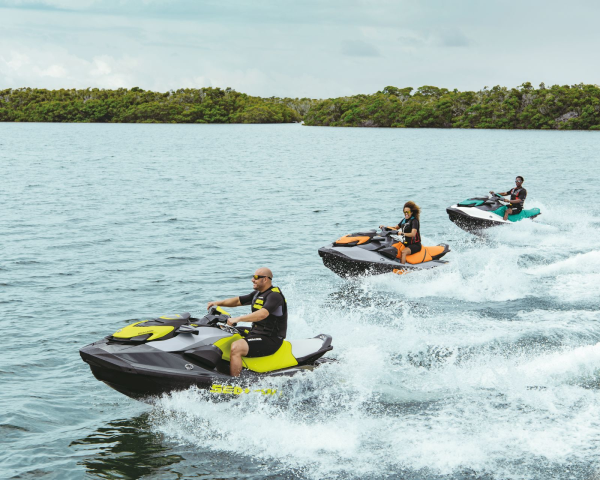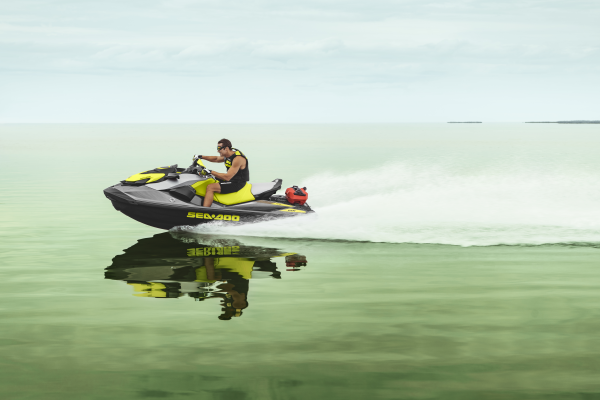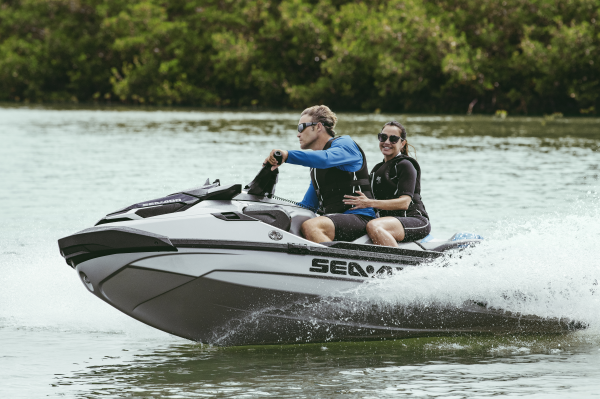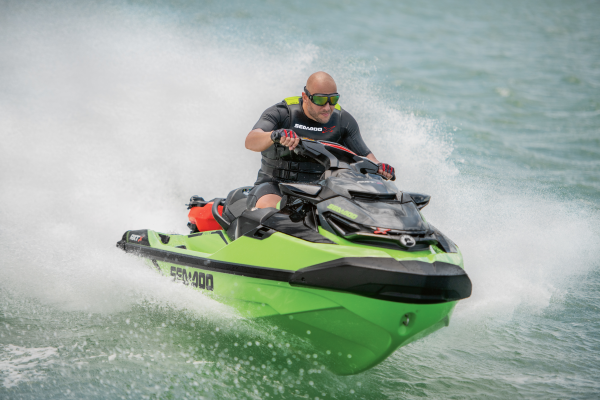Practical Advice For Choosing Jet Ski Insurance…

Related: Marine Regulations
Many riders seem to think that PWC insurance buying is a necessary evil. Consequently, the most frequently asked question is, “Where can I find cheap jet ski insurance?” But in my experience, you get what you pay for. And the lowest premium cost isn’t always best. Especially when it comes to getting appropriate Sea Doo insurance coverage. Cheaper often means bare-bones, without many options or benefits. Maybe not the best choice if your PWC adventures suddenly go wrong…
PWC Insurance Buying Overview
PWC Insurance Not Required
Right up front, here’s a fact you need to know. To the best of my knowledge, there’s no law in Canada requiring you to buy Sea Doo insurance. That’s right, so as long as you comply with other marine regulations, you’re good to go jet ski riding. But do you really want to risk your entire future by riding unprotected? If that’s your choice, stop reading now. Otherwise, I hope you’ll find these PWC insurance buying tips worthwhile in discovering whether or not cheap jet ski insurance is best for you.

The Insurance Gamble
How much you’re willing to spend on a personal watercraft premium depends on your viewpoint. Most of us go through years of jet skiing without ever filing a claim. From this perspective, PWC insurance buying can seem like an uncalled for expense with no return. After all, you’ll never see a cent back from the insurance company. Unless of course, you’re unlucky enough to suffer an incident resulting in a claim.
It’s kind of like placing a bet that only pays off if you lose. And that loss can range from watercraft damage or theft to bodily injury to death. Or a loss resulting from a liability claim against you. And with any loss, your PWC insurance buying decision can pay off big time. Or not, depending on the coverages you purchased. And how you complied with your policy terms.
Think of it this way. Say you pay $500 annually for your Sea Doo insurance. That’s $5,000 over 10 years. Yes, that $5,000 could be money down the drain. But these days, $5,000 is peanuts when it comes to watercraft replacement. Or to medical bills or liability claims. So, that $5,000 could be only a fraction of what it would cost you out of pocket to recover financially (and physically) from one incident. And that’s when you’ll be glad you got properly insured.
In my books, a Sea Doo insurance premium that buys good coverage is a solid investment in your future well-being. Understand however, that I’m not advocating to always buy the most expensive jet ski insurance available. What I’m saying is to spend what’s necessary to get appropriate coverage for you.
About Marine Insurance
Before continuing, let me say that I reside in Ontario, Canada. So that’s where my PWC insurance buying experience comes from. Regardless, your jet ski insurance needs will be similar wherever you live. Just make sure that you adapt my advice to fit your own jurisdiction and its laws.
In Canada, pleasure craft are federally licensed. So your personal watercraft is subject to the Marine Insurance Act and Canadian Maritime law, as well as applicable provincial or municipal regulations. Regardless, disagreements or disputes arising from your jet ski policy are subject to the Federal Court of Canada.

Key Differences Between PWC and Other Motorized Recreation Insurance
So, the jurisdiction for PWC’s is different from snowmobiles, ATV’s and motorcycles. Jet skis are provincially regulated and licensed. Also, the land-based vehicles are typically insured under provincial automobile insurance statutes. So don’t assume that personal watercraft insurance coverage is the same. Or even as good as what may be familiar for your other recreational vehicles. This context makes for some rather unusual and unexpected conditions to be aware of when jet ski insurance buying…
In Ontario for example, be very aware of accident benefits. By law, motorized vehicles covered under your automotive policy deliver standard accident benefits in the event of a bodily injury. Similar in fact, to what you would receive after a car crash. But not so with your jet ski policy, which may pay very limited and low accident benefit amounts. So to protect your livelihood and dependents, you may want to arrange additional accident benefit coverage for PWC riding and Sea Doo touring.

PWC Insurance Buying Questions
Within the context of the preceding overview, I’ve selected several key questions. You should be asking for answers when PWC insurance buying…
What Do I Want To Insure?
Your coverage choices directly impact how much your premium costs. The least expensive choice is for damage or theft to your jet ski. Also, the same coverage for your PWC trailer shouldn’t increase your premium much. That’s because with either choice, the most that your insurer would have to pay is the insured value of each item.
Where things start to get more expensive is for bodily injury or liability coverage. That’s because there is no limit to how much these kinds of claims could be. So, their coverages cost more to buy. But riding without them could bankrupt you if tragedy strikes.

What PWC Insurance Documents Should I Receive?
Your insurer should provide the following three items. One is their policy wording. This is the boilerplate legalese that’s the same for every one of their Sea Doo policies. It states what you’re covered for. And what you’re not. It also includes definitions of important words and phrases used in the terms and conditions.
Item two is what’s known as the declaration. This is typically a one-pager that identifies what item(s) are covered under your specific policy by year, model and serial number. It also includes what value (including tax) you are insuring the item(s) for, and any deductible that applies. Finally, the declaration will specify your premium amount and the period of coverage (usually one year). Check this document carefully to make sure it is correct and accurate. If not, report any discrepancies immediately to avoid problems later. The declaration page typically includes proof of insurance slips. Separate these and keep on your person while riding.
The third item is your premium invoice. This is the amount you must pay with tax for your jet ski coverage to be valid.
Who Is Covered to Operate My PWC?
Don’t assume that your policy covers other riders using your personal watercraft. So check the wording carefully if there’s a possibility anyone else riding your jet ski. The policy wording will confirm that the “named insured” is only you. It may not even include your spouse. Additionally, it may or may not include your immediate family.
Also, your Sea Doo insurance may or may not allow so-called “incidental use” by unnamed other persons for private pleasure purposes. If not, then only you can ever ride it. So, don’t allow anyone else to operate your ski for even a moment. Because if something goes wrong, you’re probably not covered. So no casual ‘try-it’ rides in front of the cottage. Or allowing someone else to load your jet ski on a trailer at the launch.
Regardless, for coverage to remain valid, all permitted operators must be of legal age. And obey all other applicable laws while jet ski riding or Sea Doo touring.

Where Can I Take My PWC?
Jet ski insurance purchased in Ontario may or may not be good for all of Canada. This is because most PWC policies impose navigation limits on your jet ski use. So for example, your coverage may not apply if you trailer or ride your jet ski south of the 40th Parallel. This 40° north latitude passes through many northern U.S. cities. Like Philadelphia, Pennsylvania, Columbus, Ohio, Indianapolis, Indiana and Pittsburgh, Pennsylvania. Also, there may be restriction on distance from shore on coastal waters. Go any farther than these limits and you’re no longer covered. So no towing your personal watercraft to Florida for a winter vacation with that policy!
What Uses is My PWC Covered for?
Typically, your personal watercraft will be covered for your use on the water. And at launches and while docked or stored. Also, while being trailered. But note that liability while being trailered may not be covered. For instance in Ontario, liability while trailering is covered under the auto policy of the tow vehicle. Not by your jet ski insurance.
Meanwhile, some Sea Doo insurance policies specify a timeframe during which your personal watercraft must not stored. Typically during the winter months. Then, it must be properly winterized and stored out of the water. Note that freezing damage may not be covered. And when your jet ski is parked or stored on a trailer, many policies state that the trailer must be secured with at least a coupler lock.
In addition, most jet ski insurance policies exclude any commercial use. Among other things, this means you can’t rent your jet ski to anyone. Or accept any other compensation for letting someone else ride it. You also can’t provide it to anyone else as part of a rental or swap package for your waterfront property.
Finally, Sea Doo insurance may have exclusions for racing, competitions and certain types of watersports or towing. What’s more, your coverage may be invalid if you boost the engine horsepower more than stock. And if you rent another jet ski anywhere, your policy may not cover that use. So know what you can and cannot do before you buy. Otherwise, you might discover too late that you’re not covered.

How Much Will I Get If My Jet Ski Gets Stolen or Written Off?
PWC insurance payouts vary. The best is full replacement cost. This means you get back the exact amount you paid, plus taxes with no deductible. Just be sure that your PWC declaration page states the correct price from the get-go. Some policies will start depreciating your new jet ski’s value after it’s a year old. Others will hold off any depreciation for a couple of years. Obviously, the longer the better. Because then you’ll have more money to buy a replacement in the event of theft or unrepairable damage. In addition, check out how much you’ll be paid for missing gear and equipment. Some Sea Doo insurance policies have lower limits than others.
Other Questions To Ask
While you’re at it, also ask about claim forgiveness. Some policies guarantee your premium won’t increase after one claim. You may also be able to lower your premium slightly by increasing your deductible(s). This is the portion of any claim amount that you have to pay before your jet ski insurance coverage kicks in.
Where Should I Buy My PWC Insurance?
As previously mentioned, personal watercraft insurance is a marine policy. But only a handful of companies specialize in this. So be sure you’re dealing with a reputable company with solid marine insurance expertise.
Also, when buying any insurance, there are three important factors to consider. One is coverage & options. Two is price. And three is after claim service. In my experience, each of these is easier and better through a knowledgeable insurance broker.

Having a personal broker relationship beats trying to deal at arm’s length with a faceless insurance company for a one-size-fits-all policy. Certainly, purchasing cookie-cutter insurance through a call center or online starts you off as just another impersonal number on their roster. Is that what you want to be when you need help or to file a claim?
Alternatively, a broker can walk you through your choices to get what’s right for you. Also, help you be more confident about what you’re buying and why. But most of all, a good broker will be there to assist with the entire claim process. Your broker will be the advocate and advisor who can connect with your insurer in ways that you cannot. Plus, using a broker doesn’t mean more expensive premiums. In fact, it may save you a little money upfront. And a bunch of potential headaches later.
Why Are Some Jet Ski Riders Dissatisfied With Their Insurance?
Too often jet ski insurance companies get a bad rap. Why? Because PWC owners are too busy looking for cheap jet ski insurance to ask the right questions beforehand. Or to compare policies properly. Or to understand what they are actually buying. Some Sea Doo owners even violate terms or conditions in their policy. Then, when something bad happens, the insurer gets blamed. All because a personal watercraft owner didn’t do proper homework ahead of time.
Sure, jet ski insurance companies aren’t perfect either. And some treat customers poorly or impersonally. This can be especially true while dealing with call centres. But you can greatly increase your odds of getting what you need, when you need it. Just make sure you select the right company and the right policy upfront. And that doesn’t always mean choosing the most cheap Sea Doo insurance!

My Last Word
I should conclude by stating categorically that I’m no jet ski insurance expert. And that my tips and advice are based on my own Sea Doo experiences. They are provided only to help get your PWC insurance buying started. They are not intended to replace expert advice from a qualified insurance broker.
Always remember that the cost of your jet ski insurance policy directly reflects who assumes the greater risk. Cheaper usually means you take more risk. More expensive, that your insurer takes more of your risk. So bottom line, PWC insurance buying really comes down to these last two questions. How much risk you are comfortable assuming yourself? Or are you willing to pay more for the insurer to take more of that load? And that’s the bottomline about cheap PWC insurance versus full & complete coverage.
If you enjoyed this post, check out my other riding tips.
The tips and advice in this article are the opinions of the author, may not work in every situation and are intended only for the convenience and interest of the reader, who has the personal responsibility to confirm the validity, accuracy and relevancy of this information prior to putting it to their own use.
